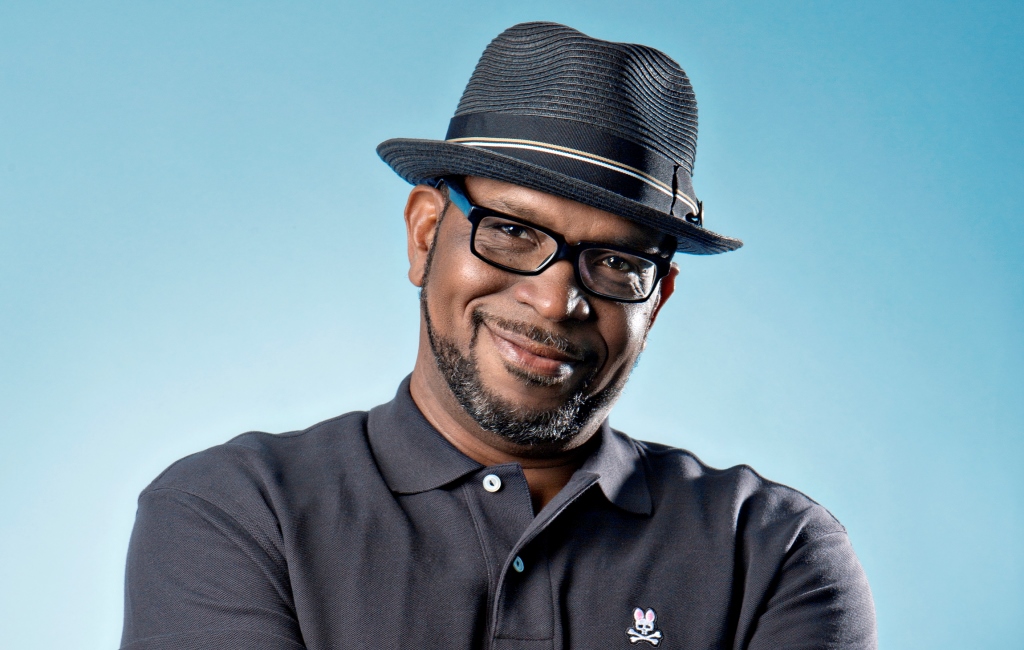
By: Dove
Any of us who grew up listening to Miami Bass music are more than familiar with the name Uncle Luke. A true pioneer in Hip Hop, Luther “Uncle Luke” Campbell was much more than a polarizing performer. The South Florida native also paved the way for independent music business structure in a secondary market, and won hard-fought legal battles for freedom of speech in music that gave us Parental Advisory stickers when the powers that be wanted to ban rap music altogether.
In addition to now being a family man, football coach, community activist and entrepreneur, Campbell also penned his own book The Book of Luke: My Fight for Truth, Justice and Liberty City, a brutally honest look at his life and times as he rose from extreme poverty in Miami’s Liberty City neighborhood to international success.
As a longtime fan of both his music and business sense, you can imagine my excitement as I sat down with Luther Campbell to learn more about his memoir. In the conversation, we also find out what has motivated this inspirational go-getter from day one, and why people need to remember his name. Read on as Uncle Luke gives UrbLife his own brand of Tough Love…
What was the moment you decided to write this book?
Luther Campbell: Well, the thing is throughout my life things have been going on. People have been talking about documentaries, movies, books; all different types of things, but things have been going on. All of the way up to a couple of years ago I was fighting to become a high school football coach and that would have automatically stopped the press until things got done. So I just thought everything’s kinda cooled down and thought that this is the perfect time to do it.
After winning the fight of being able to be a coach, I said “This is the time to do it, because people need to be able to know the history.” People need to know who created the South, fought for history, fought for free speech, went to jail for it, people need to know all the stories. People need to know who created that. They need to know things that they’re not going to give me credit for. I mean, you’re not gonna see me get an honor on MTV or BET or Grammys or anything like that. I need to just tell the story, and then I’ll feel cool about it.
Do you see yourself making a movie based upon your story?
LC: I think it would be real interesting. Once people read the book and hear all these different stories, they are like amazed like “Oh this went on? Wow I didn’t know this.” Even young people in the business right now, you heard? Everybody that I do an interview with, there’s something that they didn’t know, all the way to Ed Lover. Doing an interview with him it’s like, “Man I was around you and didn’t even notice, but it does make sense now and now I do know.” My voice has always been silent when it comes to people understanding what contributions to the music business I’ve made.
How does it feel looking back at all the legal and professional fights you’ve had? Do you want to keep fighting, or are you over it now?
LC: I’m so proud of the book, because I get to tell those stories about those different fights and hopefully it inspires others. Once you become successful in whatever it is you want to do, with success comes the haters, and before you know it you’re in court fighting for all different types of things. Whatever it is: child support, business partners trying to take what you’ve built, or just people who don’t know you who then tell you that you’re a misogynistic pig and all that. I just tell people all the time, “Whatever you believe in, just do it. Don’t care about what anyone else has got to say, as long as you’re doing it respectfully.”
The stories in the book are so amazing. We talk about fighting for freedom of speech; getting a record deemed obscene by a federal judge. I didn’t have to appeal anything. I could’ve easily agreed with the record being obscene, and we don’t need that. It wasn’t no one else’s money but mine, no group members or anything like that. Now we’re gonna fight this and take it to the door and officially got that overturned, and then again fighting for credibility.
Then I’m sitting there watching Salt N Pepa and Kid N Play on the Donnie Simpson show saying “These guys are bad for the music”. Whether it’s Jesse Jackson, Al Sharpton, you name it they are saying we’re bad for the music. So you’re looking at a whole race of people you think are gonna have your back crapping on you. You just gotta hold steadfast and say, ‘Look I’mma fight for this. This is what I believe in, because they don’t understand the big picture. The big picture is nowadays Lil Wayne and everybody else can say whatever they want to say on a record. If I lost that fight, Hip Hop would probably be crushed.
How were you and your friends different in your 20’s in contrast to what you see in current 20-somethings in the business?
LC: Well, it’s the same in a lot of ways. When I started out with my record company, it was no other Black-owned record company, period. I mean you had Def jam, which was owned by CBS, then you had Sugar Hill owned by Robinson and them, but that came before me, but as far as the South was concerned, you had nothing. Then you didn’t have this thing of an artist owning his own label and putting on other people. I basically changed the whole way that people did business. Artists went back and said “I wanna be like Luke.”
So the music industry had to change its way of doing business, even though they gave these guys so called label deals, they still owned them. It wasn’t like Luke; they had to work within the system. So when I look at a lot of these young guys online doing their songs, putting them on YouTube, putting them [online]and getting these big Twitter followers, I kind of see a lot of myself in them. They are like entrepreneurs doing their own thing, and fortunately using the avenue of the internet to be able to attract so many people to listen to their songs which is great.
I think they are doing well in that aspect, but when it comes to radio and mass [outreach], there are no more BETs, MTVs, Video Jukeboxes [actually playing videos], and radio stations are all screwed up. Fortunately they have vehicles like YouTube and all these different places they can market and promote their product.
Have you found ways to use the internet to help you grow as businessman, or do you shy away from it?
LC: Nah, I love the internet. Everything I did was underground. I never got publicized. You ain’t never see me on the cover of Vibe. The only cover I was on was The Source, that was it. So the internet is a great tool for a person like myself for people who want to know something about Hip Hop. They can go online and Google, or they can go online and I can communicate with people. I love communicating with people through my Twitter, Facebook and Instagram. I look at it from the standpoint of a great marketing tool.
When people read the book, they’ll see how I basically had to market my own music and get it [to fans]from out of the trunk of a car. I mention stories of learning to get distribution and going to this guy Fred Hill and him turning me onto one record store and another one, and then turning me onto another distributor, and Jerry turning me onto other radio stations around the country. It’s amazing, and it tells the story of that young entrepreneur, and hopefully these young guys who are online will say “Oh man, I can do it like that as well.”
What was the earliest piece of useful tough life advice you received from someone, and how did you apply it to your life?
LC: I always got great advice from my mother. She would tell all five of us: “Trouble is easy to get in and hard to get out.” That goes for anything. Whether you date the wrong girl, knock the wrong girl up, go with the boys and have a big brawl and go to jail and get in trouble, or just have a bad business deal it’s hard to get out. So I always took that to heart. Everything I always did was using common sense.
What is the number one thing you want people to know about your legacy?
LC: That I did it my way, whatever it was. I changed the face of Hip Hop, the way people do business; influencing young people who want to be entrepreneurs and own their own record companies. I fought for the right for them to be able to say the things they say on the record. You talk about people like Trick Daddy and Pitbull, these are guys that I discovered. I’m proud of everything that they accomplished, and all of the things that they’ve done so I’m humbled. These were “nobody” kids. These were kids that were left for dead. I really think that if I had not discovered the two of them as well as JT Money from the Poison Clan, they’d be dead right now, because they were living that life.
I talk about these things in the book. I talk about our stories, the Trick Daddys and Pitbulls of the world. That’s why the book is so important. People will look at it and be totally amazed about a lot of things. Guys who were living a different kind of life made choices so I’m happy to be influencing them now. Through the book, hopefully I can influence and inspire people.
What do you want people to know most about you at this stage of your life and career?
LC: I want them to know who Luther Campbell really is, what I’ve done for the industry. The industry never told my story, this is my opportunity to tell the world that it wasn’t just Russell Simmons, and no, Master P didn’t discover the South. Craig Kallman and Jimmy Iovine are cool people, but now you need to hear the story of the guy they don’t talk about – the dude from the underground. That’s why I’m so happy inside.
CLICK HERE to get your copy of The Book of Luke: My Fight for Truth, Justice and Liberty City on Amazon.com
Follow Luther Campbell on Twitter @UncleLukeReal1, on Instagram @UncleLukeReal1 and at Facebook.com/UncleLukeReal1, and learn more about his history in music at LukeRecord.com

3 Comments
Al this time I didn’t know his name is Luther! Lol it sounds like his book will be a good read.
You always remember the first time you heard a Luke song. It is awesome to see how his life and career has evolved. Such longevity and he did so much for the music industry. Now to check out his book!
I absolutely love him and been following his press junket. I look up the interviews in other states on YouTube. This book is definitely in my que!